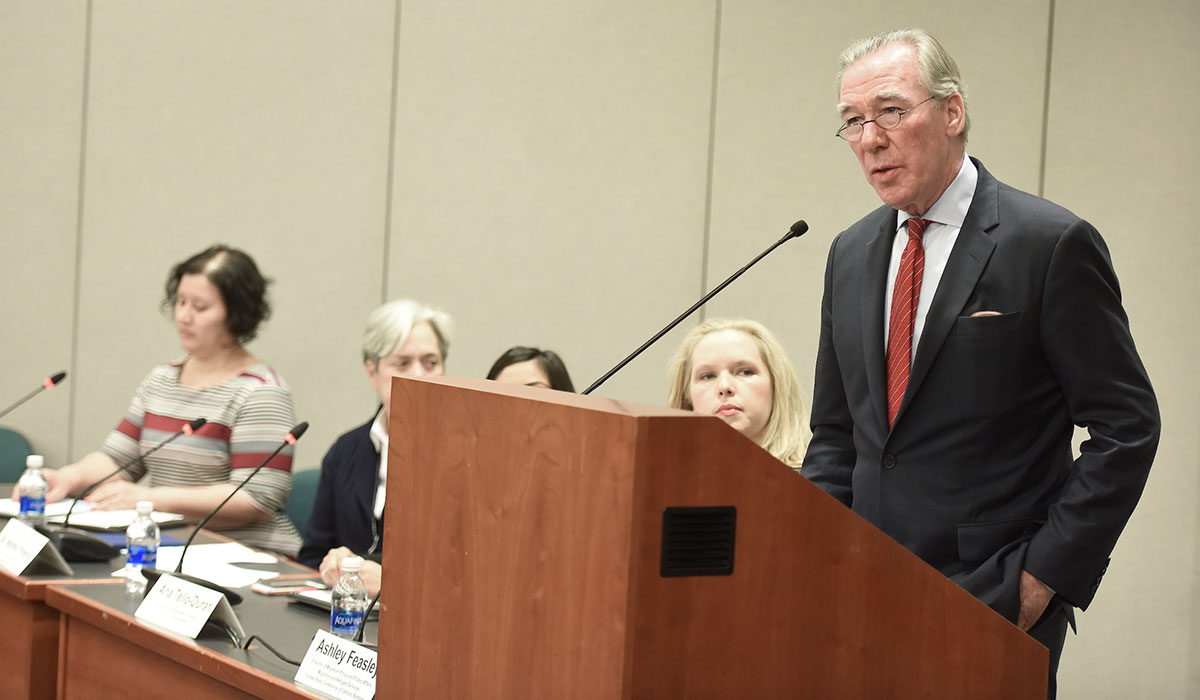

As the debates surrounding U.S. immigration policy continued to swell throughout Washington this week, a panel discussion at The Catholic University of America provided an inside look at the Catholic Church’s position on migration and “the globalization of indifference.”
The discussion, “On the Margins: At the Intersection of Catholic Social Thought and Migration,” was co-sponsored by the United States Conference of Catholic Bishops (USCCB) Migration and Refugee Services and Catholic University’s Institute for Human Ecology. It took place Jan. 11, as part of National Migration Week.
During the first panel, “Let the Children Come to Me: Stories of Migrant Children, U.S. Migration Policy, and the Catholic Church,” two women who migrated to the United States as children shared their reasons for leaving their home countries and the challenges they faced upon arrival.
Ana Tello-Duran, a graduate student at Virginia Commonwealth University’s School of Social Work, migrated from Mexico with her sister when she was 17 years old. Prior to leaving, a cartel had taken over her town and Tello-Duran shared that she saw violence “no child should see.” As an unaccompanied minor, Tello-Duran was held in an Arizona detention center for nine months before she was placed with a foster family in Richmond, Va. Since then, she has pursued a career in social work. In the future, she hopes to help other at-risk children.
Ivone Guillen, an education coordinator at USCCB, migrated with her family to the U.S. in the early 90s, after facing severe poverty. As an undocumented immigrant, Guillen said she was terrified of law enforcement officers and “grew up with the fear of not knowing if I would see my mom when I came home from school.” Thanks to the Dream Act, she was able to pursue her education goals, eventually earning a master’s degree in public administration.
“These issues (of immigration reform) transcend policy,” Guillen said. “It’s about real human beings who are embedded in the social fabric of our nation — they could be your neighbors, your peers, your colleagues, even your spouses. They each have a story to share and they each have aspirations in their lives they want to pursue and reach.”
The panel also included a reflection from Sister Norma Pimentel, executive director of Catholic Charities of the Rio Grande Valley, who shared her experiences working along the U.S. border with Mexico. In 2014, Sister Norma and her team were saddened by the large wave of unaccompanied minors entering the United States from Central America. During that time, she was granted permission to enter a detention facility run by U.S. Immigration and Customs Enforcement.
“It was heartbreaking to walk into that facility here in the United States and to find those children crying — as young as five, all packed up in cells, crying for their parents,” she said. “I asked to be let inside to pray with them.”
The second panel of the discussion examined Pope Francis’s teaching on migration in the context of the larger Catholic social teaching tradition. Todd Scribbner, an education coordinator for USCCB Migration and Refugee Services, said that as a transnational institution, the Church is in a unique position to respond to migration problems around the world.
Rev. Richard Ryscavage, S.J., who works for the Institute for the Study of International Migration at Georgetown University, said there is a “spiritual richness to the issue of migration that is not unlike any other issue in the church”, because migration narratives can be found in many variations throughout Scripture.
He was followed by V. Bradley Lewis, associate professor of philosophy and faculty fellow at the Institute for Human Ecology, who spoke about the Catholic philosophical tradition surrounding justice and immigration, dating back to the writings of St. Thomas Aquinas.
In his introduction to the day’s event, University President John Garvey said that Catholic University was a fitting place for the panel discussion, since “part of the mission of The Catholic University of America — and particularly the Institute for Human Ecology — is to bring the best of the Catholic intellectual tradition to bear on our country’s most pressing issues.
“An adequate response to the migration question involves not only respecting a country’s ability to enforce its laws, but also upholding human rights and trying to keep families together,” Garvey continued. “Above all, we have to remember that while migration is a really complicated issue, it’s not an intellectual exercise. As the Holy Father reminds us, ‘We must never forget that migrants, rather than simply than being a statistic, are first of all persons with faces and names and individual stories.’ It’s with a spirit of compassion for them that we have to begin thinking about this problem.”